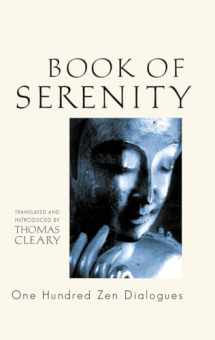
Book of Serenity: One Hundred Zen Dialogues
ISBN-13:
9781590302491
ISBN-10:
1590302494
Edition:
1st Paperback Edition
Publication date:
2005
Publisher:
Shambhala
Format:
Paperback
512 pages
Category:
Writing
,
Golf
,
Individual Sports
,
Movements
,
Philosophy
,
Writing, Research & Publishing Guides
FREE US shipping
on ALL non-marketplace orders
Rent
35 days
Due Jun 07, 2024
35 days
from $26.47
USD
Marketplace
from $30.12
USD
Marketplace offers
Seller
Condition
Note
Seller
Condition
Used - Good
Book details
ISBN-13:
9781590302491
ISBN-10:
1590302494
Edition:
1st Paperback Edition
Publication date:
2005
Publisher:
Shambhala
Format:
Paperback
512 pages
Category:
Writing
,
Golf
,
Individual Sports
,
Movements
,
Philosophy
,
Writing, Research & Publishing Guides
Summary
Book of Serenity: One Hundred Zen Dialogues (ISBN-13: 9781590302491 and ISBN-10: 1590302494), was published by Shambhala in 2005.
With an overall rating of 4.0 stars, it's a notable title among other
Writing
(Golf, Individual Sports, Movements, Philosophy, Writing, Research & Publishing Guides) books. You can easily purchase or rent Book of Serenity: One Hundred Zen Dialogues (Paperback) from BooksRun,
along with many other new and used
Writing
books
and textbooks.
And, if you're looking to sell your copy, our current buyback offer is $13.28.
Description
Book of Serenity is a translation of Shoyo Roku, a collection of one hundred Zen koans with commentaries that stands as a companion to the other great Chinese koan collection, the Blue Cliff Record (Pi Yen Lu). A classic of Chan (Chinese Zen) Buddhism, Book of Serenity has been skillfully rendered into English by the renowned translator Thomas Cleary.
Compiled in China in the twelfth century, the Book of Serenity is, in the words of Zen teacher Tenshin Reb Anderson, "an auspicious peak in the mountain range of Zen literature, a subtle flowing stream in the deep valleys of our teaching, a treasure house of inspiration and guidance in studying the ocean of Buddhist teachings." Each one of its one hundred chapters begins with an introduction, along with a main case, or koan, taken from Zen lore or Buddhist scripture. This is followed by commentary on the main case, verses inspired by it, and, finally, further commentary on all of these. The book contains a glossary of Zen/Chan terms and metaphors.
Compiled in China in the twelfth century, the Book of Serenity is, in the words of Zen teacher Tenshin Reb Anderson, "an auspicious peak in the mountain range of Zen literature, a subtle flowing stream in the deep valleys of our teaching, a treasure house of inspiration and guidance in studying the ocean of Buddhist teachings." Each one of its one hundred chapters begins with an introduction, along with a main case, or koan, taken from Zen lore or Buddhist scripture. This is followed by commentary on the main case, verses inspired by it, and, finally, further commentary on all of these. The book contains a glossary of Zen/Chan terms and metaphors.


We would LOVE it if you could help us and other readers by reviewing the book
Book review

Congratulations! We have received your book review.
{user}
{createdAt}
by {truncated_author}


